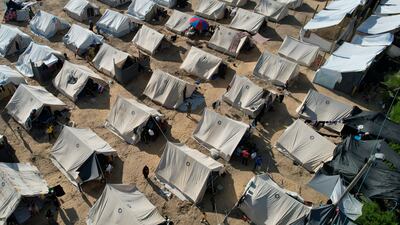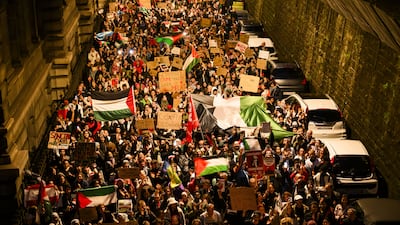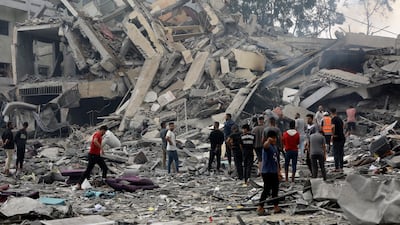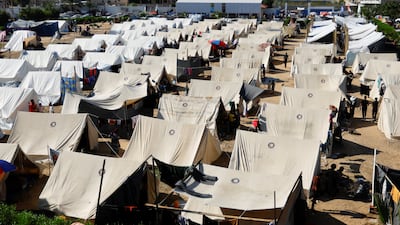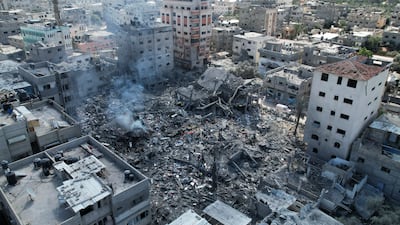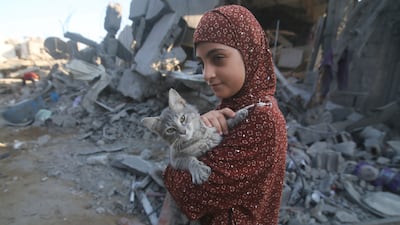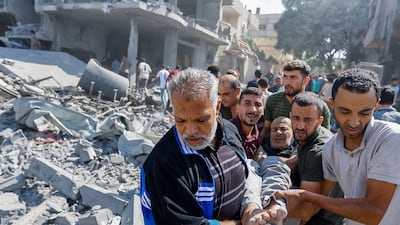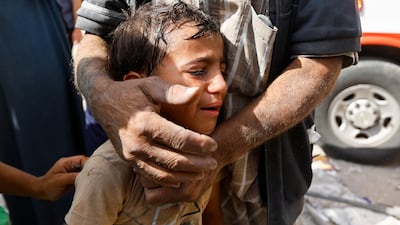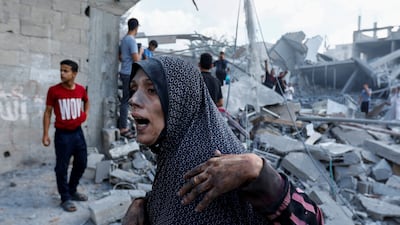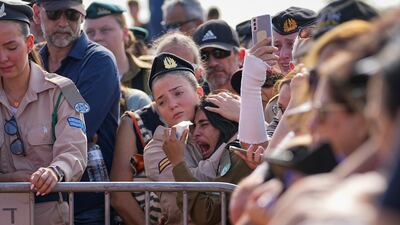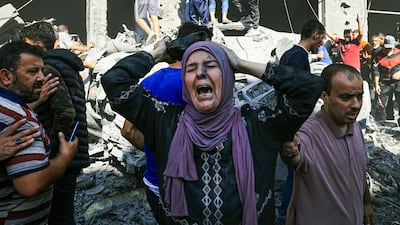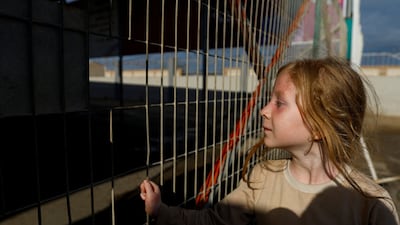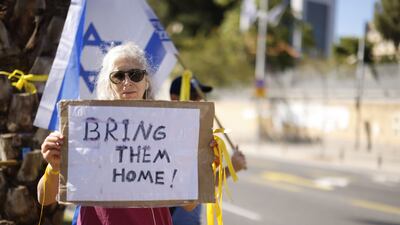Live updates: Follow the latest news on Israel-Gaza
The war between Israel and Hamas has the potential to deliver a significant blow to the Israeli economy and disrupt vital sectors, particularly if the violent fighting is protracted, analysts say.
As Israel prepares for a ground offensive against the militant group that controls the Gaza Strip, the economic cost of the conflict could run up to at least 27 billion shekels ($6.7 billion), according to estimates by Tel Aviv-based Bank Hapoalim, Israel's largest lender by credit to the public.
That forecast takes into account Israel calling up 360,000 reservists – one of the biggest mobilisations in the past 50 years – since the escalation of the conflict after Hamas’s deadly assault on October 7.
This reserve force draws on Israelis from all walks of life, who work in every sector of the economy from technology, to tourism and start-ups.
An estimated 8 per cent of the working population is drafted into the military service and, given the severity of this conflict, "there is a risk of a diversion of resources, drop in investment and loss of confidence, which would undermine Israel's economic outlook," Moody's Investors Service said in an October 19 report.
The immediate impact of calling up reservists will be a drop in economic output, especially in sectors with a high proportion of younger workers, Elliot Garside, economist at Oxford Economics, told The National.
"There are greater concerns surrounding the impact on the high-tech sector, which constitutes around 20 per cent of [gross domestic product] GDP and is expected to lose up to 15 per cent of its workforce," he said.
"In the event of a month-long conflict and a contained war, the impact will only be temporary and of smaller magnitude."
Several global companies have temporarily suspended their operations in Israel and directed their employees to work from home after the attacks.
Consumer products giant Nestle said it "temporarily shut down" one of its production plants in Israel as a precaution, Reuters reported on October 19.

Major global airlines have also suspended hundreds of flights to and from Tel Aviv in response to the conflict in Israel.
Governments such as the US, have issued "do not travel" warnings for Gaza and alerts to "exercise increased caution when traveling to" Israel or the occupied West Bank.
The reduction or cancellation of flights to Tel Aviv means fewer of the vital air links that sustained the country's key tourism industry prior to the war are open.
"We expect the tourism sector to be the most impacted. The losses will be seen due to the fall in tourist arrivals and the subsequent decline in tourist spending on air fares, accommodation, restaurants and recreational activities," Mr Garside said.
Previous conflicts including the 2000-2005 Second Intifada, the 2006 Israel-Lebanon war, Israel's 2009 conflict with Hamas as well as another Israel-Hamas war in 2014 caused tourist arrivals to fall by 25 per cent to 40 per cent in the first month and 10 per cent to 15 per cent in the second month, according to Mr Garside.
"We expect the impact on the tourism sector be most significant during the first two months, with arrivals recovering during the beginning of 2024," he said.
"The fall in tourist arrivals during these conflicts led to a contraction in services exports, particularly in the travel and transport sectors."
Travel services exports and transport services exports are expected to contract by 2 billion shekels, or approximately 0.1 per cent of GDP, according to Oxford Economics. Under a protracted war scenario, the impact is expected to be 3 billion shekels, or approximately 0.2 per cent of GDP.
Israel was aiming to reach pre-Covid levels of tourist arrivals in 2023, Tourism Minister Haim Katz said in January.
In 2022, Israel recorded 2.67 million tourists, significantly higher compared to 397,000 in 2021, according to the Tourism Ministry.
Inbound tourism in Israel in 2022 was still 41 per cent lower than pre-Covid levels in 2019, a record year for tourist arrivals, the ministry said.
Revenue from incoming tourism stood at about 13.5 billion shekels in 2022, compared to 23 billion shekels in 2019, it said.

The conflict has also had an impact on some of Israel's ports that are closer to Gaza.
The Port of Ashdod, situated just 50km from the Gaza border, is operating in an "emergency mode" only, subject to potential missile attacks, and its restrictions on vessels carrying hazardous materials remain in effect, Container Xchange said in an October 12 report.
The Port of Ashkelon, located just 15kms from the Gaza border, is severely affected, rendering it incapable of normal operations due to missile threats, the report said.
Vessels can only offload cargo while moored at sea buoys, highlighting the risks and necessity for adaptive measures.
"The Israel-Palestine conflict, marked by recent violence between Israel and Hamas, has sent ripples through the shipping and maritime industry, leading international companies to issue cautionary advisories and adapt their operations in the region," Container Xchange said.
Chevron, the second-largest US oil and gas producer, was directed by Israel’s Energy Ministry to shut down the Tamar natural gas field off the country’s northern coast.
India's Adani Ports, operator of the Haifa Port, assured stakeholders of operational readiness while closely monitoring the situation and having a business continuity plan in place.
Citing the escalating war, Moody's on October 19 placed Israel's “A1" long-term foreign and local currency issuer ratings on review for a downgrade. The outlook for the country's debt was previously stable.
“Israel's credit profile has proven resilient to terrorist attacks and military conflict in the past. However, the severity of the current military conflict raises the possibility of longer lasting and material credit impact,” Moody's analysts Kathrin Muehlbronner and Dietmar Hornung said.
“While a short-lived conflict could still have credit impact, the longer lasting and more severe the military conflict, the greater its impact is likely to be on policy effectiveness, public finances and the economy.”
The Moody's potential downgrade follows a similar move by Fitch Ratings, which placed the country's Iong-term foreign and local currency issuer default ratings of “A+” on a negative watch earlier this week.
Fitch cited “the heightened risk of a widening of Israel's current conflict to include large-scale military confrontations with multiple actors, over a sustained period of time”.
The military conflict has increased Israel's already relatively high exposure to geopolitical risks, Moody's said in its report. During the review period, the credit rating agency will assess whether the conflict is likely to move towards resolution or whether there is a likely significant escalation over an extended period.
The review will also assess the government's ability to implement policies to mitigate the economic and fiscal impact of the conflict, and manage a future recovery from the crisis.
Israel spends around 4.5 per cent of its GDP on defence, considerably more than other Organisation for Economic Co-operation and Development countries.
Israel has typically increased defence expenditure around episodes of violence in the past and will probably do so during the current conflict, Moody's analysts said.
“Higher defence spending would add to the deficit, which Moody's expected to stand at around 2 per cent of GDP prior to the attack,” they added.
In the past, conflicts that have lasted around 30 days such as the Israel-Hamas 2009 war, have amounted to 5 billion shekels in military costs, according to Oxford Economics.
Preliminary estimates show that the costs for this war are expected to be higher, at around 10 billion shekels, though this is largely dependent on the duration and intensity of the war, Mr Garside said.
Moody's would likely downgrade Israel's ratings if the agency concludes that the current military conflict was likely to "materially weaken Israel's institutions, in particular the effectiveness of its policymaking, its fiscal and/or its economic strength," it said.
The rating agency would most likely reach that conclusion if the military conflict were to escalate significantly or were to spread further beyond Israel's borders.
"The extent of any rating impact would depend on the severity of the impact to Israel's credit profile over the medium term," it said.
The full economic impact of the conflict remains highly uncertain and will likely depend on the duration and intensity of economic disruptions, Ehsan Khoman, head of ESG, commodities and emerging markets research at MUFG told The National.
"Adverse shocks to supply, demand and risk premia imply downside effects on growth, but their net impact on inflation will be conditional on which shock dominates in the short and medium term," he said.
"Lower demand implies lower inflation in the medium term, but a weaker currency due to the rise in risk premia could feed into higher inflation, at least in the short term."
The International Monetary Fund projects that Israel's inflation rate in 2023 will reach 4.3 per cent, while its GDP is forecast to reach 3.1 per cent, down from 6.5 per cent in 2022, according to the latest available data, which was prior to the war.
"The macro trajectory for Israel is now centred on a stagflationary shock and a rise in conflict-related fiscal expenditures, generating marked upside pressures on financing needs. At this stage we view that a considerable portion of the spending increase will likely be funded via external bilateral support and increased domestic issuance," Mr Khoman said.
The shekel dropped to a near eight-year low against the US dollar on October 9 after war broke out between Israel and Gaza.
The shekel has already been one of the worst performing currencies this year, down more than 12 per cent against the greenback as investors were concerned over the government’s move to overhaul the judiciary earlier this year.
On October 9, the Bank of Israel announced a programme to sell $30 billon in foreign exchange liquidity and to provide an additional $15 billion through swaps to moderate the volatility in the foreign exchange market.
The central bank “will operate in the market during the coming period in order to moderate volatility in the shekel exchange rate and to provide the necessary liquidity for the continued proper functioning of the markets”, the regulator said at that time.
"The heightened risk premia and uncertainty on the possible evolution of the conflict will likely maintain depreciation pressures, which we believe will most likely result in the Bank of Israel keeping its policy rate on hold next week," Mr Khoman said.
"Our base case scenario assumes that the economy begins to recover sustainably in the first quarter of 2024, signalling that foreign exchange pressures could take a back seat and thereby offering the space for the Bank of Israel to focus more on supporting economic recovery amid downside risks to inflation."
The first rate cut will likely come in January 2024 but, given the fluidity of the situation, the Bank of Israel could bring rate cuts forward should the projected negative impact on growth become more longer-lasting than immediate foreign exchange depreciation risks," he added.



